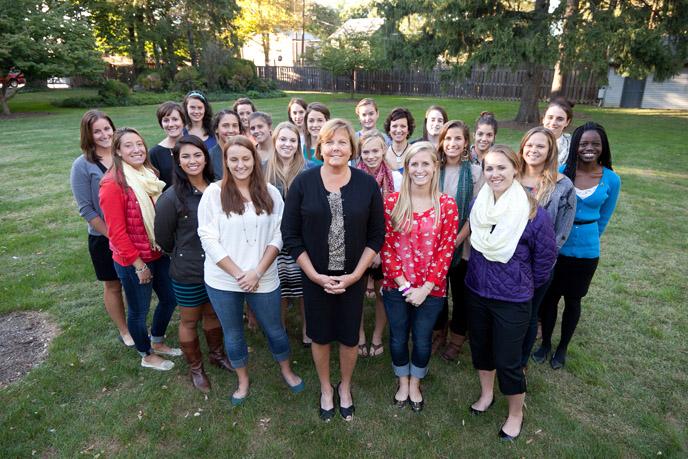Tracing Title IX’s Impact

by Matt Getty
October 2, 2012
Dickinson celebrated the 40th anniversary of the 1972 passage of Title IX, which prohibited gender discrimination in college sports, through a weeklong slate of events culminating with an alumni panel discussion during Homecoming & Family Weekend. The panel of five female athletes and one male former coach shared stories of the landmark legislation's impact as well as the lingering challenges facing women's athletics.
"We must protect and preserve Title IX by continuing to ask questions and dig deeper to protect our daughters," said Head Women's Basketball Coach Dina Henry, who served as moderator.
Karen Pflug-Felder '71, who played basketball and field hockey at Dickinson before the law was enacted, offered her perspective on life before Title IX. In addition to having more players on the floor, she reported, female basketball players were not allowed to dribble more than three times because they were thought to be "too fragile" and didn't enjoy the same access to facilities as men did.
"Women's basketball practiced between 10 and 11 at night after the men's varsity and intramural teams were finished," said Pflug-Felder, who coached women's lacrosse, basketball and softball as a biology teacher at at Methacton High School in Eagleville, Pa., from 1972 to 2005 after graduating from Dickinson.
Similarly, Dolores Giachetti Shank '87, who played basketball and softball at Dickinson and went on to coach both sports at Big Spring High School in Newville, Pa., explained that before Title IX there were no professional opportunities for women in athletics. "It wasn't reliable to pursue athletics as a profession," she recalled. "That wasn't taken seriously when I was growing up."
Younger athletes, like Kim Unsworth Franklin '96, highlighted the law's legacy by sharing contrasting experiences after Title IX was enacted. "I definitely benefited from its implementation," said Franklin, who was inducted into Dickinson's Sports Hall of Fame during the weekend for her exploits as a swimmer. "I feel at Dickinson we had equality in sports. I never felt the men on the swim team were held in higher regard."
Liz Allen Starks '02, who also was inducted into the Sports Hall of Fame, agreed. As a runner on Dickinson's women's indoor and outdoor four-time conference champion track and field teams, she explained that she benefited from Title IX in ways she understands only in retrospect.
"If Title IX didn't pass, I don't know if I would have been able to have the experience I did," she said. "It impacted my future and transformed my life in ways I wasn't aware of."
That impact, the panelists stressed, extends well beyond the playing field. In addition to opening more professional opportunities for women in sports, they noted, opening college sports to women has provided experiences that continue to benefit women athletes after they leave college.
"I've learned to take what you learn in sports and apply it your life," said Christine Hufenbecher '02, another 2012 Sports Hall of Fame inductee. "It's important for women to have equal rights."
Albert Masland '79, who coached Dickinson's first women's soccer team in 1984, provided some insight into the law's early impact. Though Title IX established legal equality for female athletes, he noted, women still had to overcome cultural stereotypes that labeled them as physically inferior to men.
"I had to check my own bias at times," he admitted. "The women were driving things forward. It took some time for real equality to develop."
Despite the huge growth in women's athletics, panelists agreed that progress still needs to be made. Though many more women are playing and coaching today, they explained, those cultural biases remain.
"Even today, I find it a bit disappointing how much focus there is on the appearance of women athletes," said Starks. "A recent example is this past Olympics. People were so focused on Gabby Douglas's hair and not her athletic ability. There isn't as much change in that regard as there should be."
In addition to the panel discussion, Dickinson's weeklong Title IX anniversary celebration included a Celebrate Sports Mosaic in the Kline Center and a Clarke Forum conversation with William Smith College Lacrosse Coach and Associate Athletic Director Pate Genovese, the winningest lacrosse coach in Division III history.
Published October 2, 2012